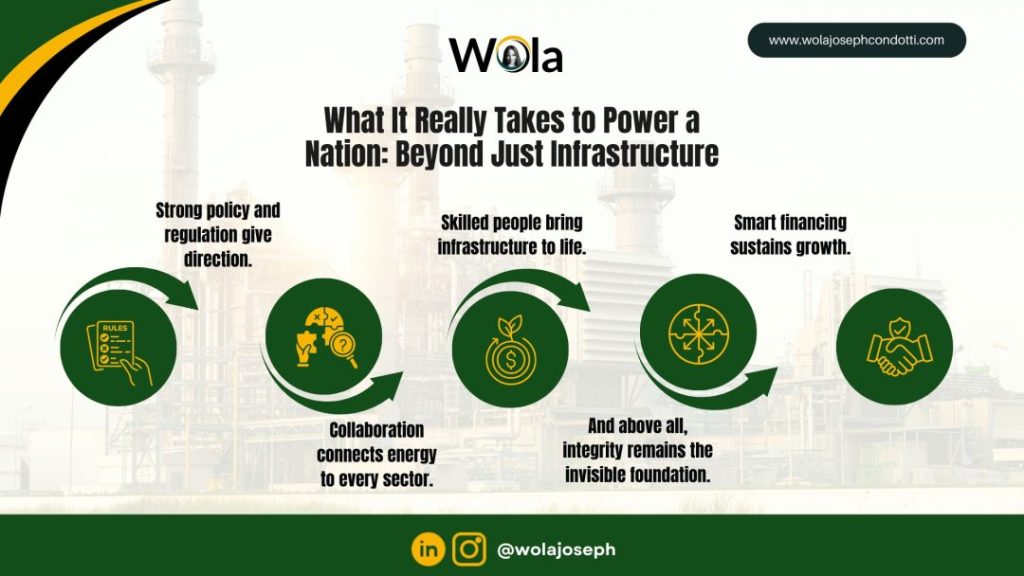When conversations around powering nations arise, the first thing many people think about is infrastructure: power plants, transmission lines, gas pipelines, or solar farms.
While these physical assets are important, I have come to learn that building a truly functional and sustainable power sector requires more than concrete, steel, or megawatts on a grid.
To power a nation is not just to “switch on the lights.” It is to build the systems, policies, people, and values that allow those lights to stay on, and for citizens and businesses to progress as a result.
Infrastructure is only one piece of the equation.
1. The Role of Policy and Regulation
Strong infrastructure can not survive weak policy.
A clear regulatory framework is the backbone of any energy system. Investors need certainty. Citizens need fairness. Operators need direction. Without consistency in regulation, infrastructure becomes stranded or underutilized.
A nation can build the most impressive assets, but if tariffs are distorted, contracts are not enforceable, or regulations change overnight, growth will be hindered.
2. The Power of People
Technology and infrastructure can only deliver results when the right people manage them. Skilled engineers, visionary policymakers, and ethical leaders make the difference between power projects that succeed and those that fail.
Human capacity, developed through training, mentorship, and leadership development, is as critical as any turbine or transmission line. Nations must invest not just in equipment but in people who will steward those systems with competence and integrity.
3. Financing with Foresight
Sustainable power requires sustainable finance. In most cases, projects are built with funding structures that fail to consider long-term realities. A nation that wants to truly power itself must align infrastructure projects with financing models that prioritize longevity, affordability, and impact.
Smart public-private partnerships, innovative financing tools, and transparent governance are very important.
4. Collaboration Across Sectors
Energy does not exist in isolation. It touches every aspect of life, which includes healthcare, education, transport, agriculture, and technology.
To power a nation is to understand these intersections and create collaboration between ministries, regulators, private sector players, and communities. When collaboration is missing, even the best built infrastructure cannot deliver the results it was designed for.
5. Integrity as the Invisible Infrastructure
Perhaps the most underrated “infrastructure” of all is integrity. A nation cannot power itself if corruption undermines projects, if contracts are abandoned halfway, or if service delivery is traded for personal gain.
Integrity builds trust, and trust sustains systems. Without it, infrastructure is nothing more than empty structures.
Here are my closing thoughts on this:
Powering a nation goes far beyond bricks and mortar, turbines and panels. It requires visionary policies, empowered people, sustainable financing, true collaboration, and the invisible yet powerful foundation of integrity.
If we focus only on building infrastructure without addressing these deeper layers, we will keep building and will never arrive at a good result.
But when we align infrastructure with values, vision, and people, we do not just power homes and industries, but we power hope, innovation, and the future of generations to come.
#energyleadership #powersector #nigeriaenergy #infrastructure #leadership #wolajoseph #wolajosephcondotti

